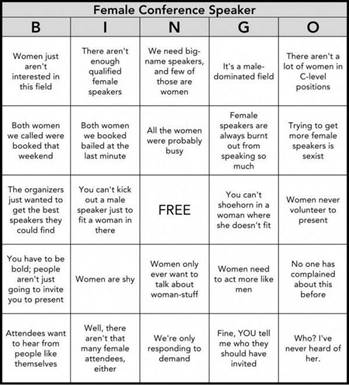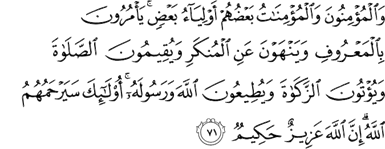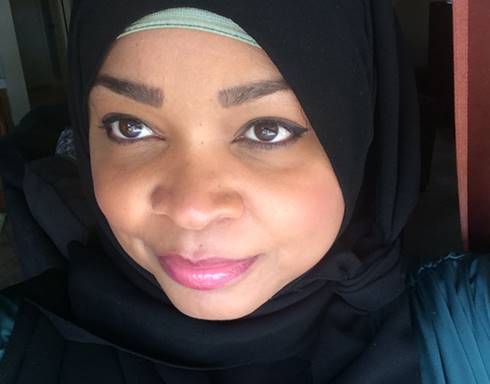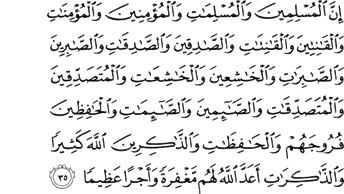“Organizing Inclusive Events.” When I saw this subject line in my inbox, my heart leapt. “It’s about time,” I triumphantly thought to myself as I opened the email. My excitement was short lived because once I scrolled down to the speaker lineup for the conference, I realized not a single woman’s name was on the list.
I wasn’t the only one who noticed. Other Muslim female activists and scholars pointed out that our gender’s perspective had once again been excluded. Their criticisms drew comments from men (and women) on a Facebook thread who accused these women of wanting to be in the limelight. “Let the brothers lead. You’re being divisive!” What started as a suggestion about best practices and inclusion at Muslim events devolved into a drawn-out and public fight.
Although the online discussion quickly stagnated into defensive posturing and ad hominem attacks, it reminded me all the more of the dire need to prevent the sense of erasure that so many women of all ethnic groups feel.
It is clear that both men and women are equally vital to the development of the American Muslim community, but the absence of women as authoritative voices in our mosques, conferences and other sacred spaces seriously undermines our efforts to strengthen our community. When women’s voices are silenced, it also keeps us from empowering all other marginalized groups in our midst (black Muslims, young Muslims and new Muslims, to name a few).
Muslim American women are highly educated, with expertise in fields such as medicine, social services, education, Islamic studies, public relations and non-profit development. Many start off with a zeal to use their skills within the Muslim community, but after realizing that their contributions are not particularly valued and their opportunities for leadership positions limited, they lose interest and move on to work outside the community.
The way in which we devalue our women’s skills and points-of-view is no more apparent than at Muslim events. Qualified female academics, professionals and activists—and there is no shortage of such ladies—are rarely invited to speak. Their absence means that issues affecting Muslim women, such as accessibility of prayer spaces, gender based violence, or challenges of balancing work-family life, are conspicuously overlooked or presented in a one-sided fashion. If a female does sit on the panel, it is usually because conference organizers want to mollify critics. Her perspective is not integral to the discussion as the male-majority panel drowns out the voice of the lone female. At the end of the day it is the audience’s loss; excluding women robs them of important insights and expertise that these women would bring to the community building table. This lack of representation contrasts with the heavy lifting that women do as backbones of our communities, organizing and working tirelessly in off stage and in the shadows.
 Chart: The Female Conference Speaker Bingo and the Tumblr account Congrats, You Have an All Male Panel highlight how this issue transcends religion.
Chart: The Female Conference Speaker Bingo and the Tumblr account Congrats, You Have an All Male Panel highlight how this issue transcends religion.
The organizers of Muslim events should take a page or two from the corporate world, the academic world and nonprofits, which value inclusion and diversity. “Multiple voices lead to new ideas, new services, and encourage out-of-the box thinking,” says Forbes Insight. In fact, this lesson sits even closer to home, within our traditions of shurah (religious consultation), which tells us to take into account the perspectives of representatives of those who are affected by a decision. The Qur’anic chapter Shurah (consultation), describes how Muslims should handle issues of community-wide importance. “…their affairs are run by mutual consultation” (Quran, 42:38). The Prophet Muhammad (peace be upon him) consulted his wives on religious and political matters, and he would consider the points of view of female companions who came to him with complaints. Inclusion shouldn’t stop at gender, but should also encompass class, ethnicity, age, and religious orientations. For a more complete list of suggestions for organizing inclusive lists, please visit my blog.
Ironically enough, while we exclude women from our spaces and our discussions, Allah makes it a point to include them in each and every sentence of a Qur’anic verse that describes a true Muslim.
“Verily for all men and women who have surrendered themselves to God, and all believing men and believing women, and all truly devout men and truly devout women, and all men and women who are true to their word, all men and women who are patient in adversity, and all men and women who humble themselves [before Allah], and all men and women who give in charity, and all self-denying men and self-denying women, and all men and women who are mindful of their chastity, and all men and women who remember Allah unceasingly: for [all of] them has Allah readied forgiveness of sins and a mighty reward.” (Surah Al- Ahzab 33:35)
Not only does Allah explicitly mention women again and again when describing the believers, He also says that a characteristic of the Muslim community is that its men and women protect, help and collaborate with one another to do good.
 The believing men and women, are protectors and helpers of each other. They (collaborate) to promote all that is good and oppose all that is evil…. (Surah Al-Tawbah 9:71)
The believing men and women, are protectors and helpers of each other. They (collaborate) to promote all that is good and oppose all that is evil…. (Surah Al-Tawbah 9:71)
The message of cooperation between the genders could not be any clearer. Men and women in the Muslim-American community must build mosques and Islamic centers–together. We must work to create civil society organizations to serve our community’s social, economic, and political needs– together. We must host dialogues, conferences, and talks to discuss our dilemmas and our achievements–together.
[separator type=”thin”]
Margari Hill is Programming Director of Muslim Anti-Racism Collaborative and Assistant Editor at AltMuslimah





